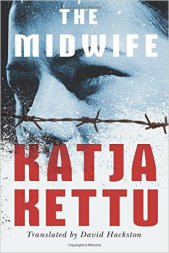Apologies for the lack of reviews on Crimepieces in the last two weeks. As well as promoting the publication of the paperback of A Deadly Thaw, I’ve also been proofreading the next book in the series, A Patient Fury, which is out in September. This hasn’t stopped me reading, however, and I’m finally catching up with my reviews.
First up is a summary of the Nordic books I’ve read.
 Helene Tursten is a Swedish writer who isn’t as well known in the UK as she deserves to be. Her novels, featuring detective Irene Huss, are well plotted police procedurals that, in the finest Scandi tradition, also draw readers into the personal lives of the characters.
Helene Tursten is a Swedish writer who isn’t as well known in the UK as she deserves to be. Her novels, featuring detective Irene Huss, are well plotted police procedurals that, in the finest Scandi tradition, also draw readers into the personal lives of the characters.
In her latest book, Who Watcheth, a man is stalking his women victims and sending them gifts before strangling them. An early victim who survived the attacks remembers his unpleasant smell but nothing else. Huss is also being persecuted by a cyber stalker who is unhappy with Huss’s involvement in an earlier case. It’s been a while since I read Tursten and I think she’s one of the best Nordic writers around. The prurient nature of the killings is never overdone and Who Watcheth is enhanced by a finale that isn’t overly dramatic. The translation is by Marlaine Delargy.
 Another favourite writer of mine is Gunnar Staalesen. His latest book, Where Roses Never Die, features the resurrection of an investigation into the disappearance of a missing girl and the social dynamics of a small housing estate in the 1970s. Staalesen’s detective, Varg Veum, is in a sorry state, drinking heavily and forced to take on cases he would normally reject.
Another favourite writer of mine is Gunnar Staalesen. His latest book, Where Roses Never Die, features the resurrection of an investigation into the disappearance of a missing girl and the social dynamics of a small housing estate in the 1970s. Staalesen’s detective, Varg Veum, is in a sorry state, drinking heavily and forced to take on cases he would normally reject.
As we expect from Staalesen, social issues are combined with a fine murder plot but the multi layers of the deception that’s revealed makes Where Roses Never Die his best book yet. The translation is by Don Bartlett.
 Finally, I read in January an unusual and thought-provoking novel by a Finnish writer, Katja Kettu. In The Midwife, a woman unflatteringly named Weird-Eye by the small community where she delivers babies meets Johannes, a war photographer working for the SS. She takes a job as a nurse in a nearby prison camp to be near him but gets drawn into the mechanics of the surroundings as the war’s end draws near.
Finally, I read in January an unusual and thought-provoking novel by a Finnish writer, Katja Kettu. In The Midwife, a woman unflatteringly named Weird-Eye by the small community where she delivers babies meets Johannes, a war photographer working for the SS. She takes a job as a nurse in a nearby prison camp to be near him but gets drawn into the mechanics of the surroundings as the war’s end draws near.
It’s a difficult book to review as I was completely captivated by the language of the story which must have been a joy to translate. The prose is earthy and brutal, describing a period in time where survival is a result of stamina, circumstance and finding a place in the community and landscape. I knew little of the stationing of German troops in northern Finland and the Lapp setting is woven into the narrative. The timeline makes for some challenging reading with the occasional inclusion of superfluous official documents but the story of Weird Eye is unique and moving. The excellent translation is by David Hackston.
Advertisements Share this:





